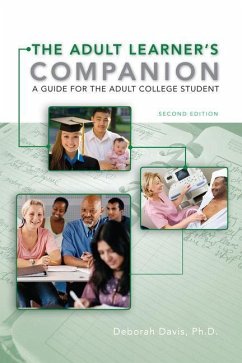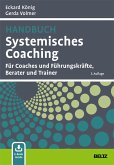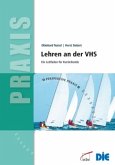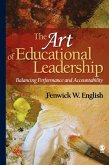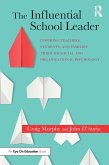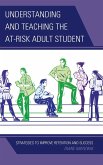Deborah Davis
The Adult Learner's Companion: A Guide for the Adult College Student
Deborah Davis
The Adult Learner's Companion: A Guide for the Adult College Student
- Broschiertes Buch
- Merkliste
- Auf die Merkliste
- Bewerten Bewerten
- Teilen
- Produkt teilen
- Produkterinnerung
- Produkterinnerung
Adult learners face unique challenges--work, family, and the numerous responsibilities and obligations that they must juggle while pursuing a degree. With limited time and financial resources, adult learners need to know where and how to get help quickly and easily, and who to turn to when they have questions. The second edition of THE ADULT LEARNER'S COMPANION: A GUIDE FOR THE ADULT COLLEGE STUDENT preserves the principal core of the first edition while extending the scope and relevance of the relationship between life experience and its practical application to college and work. Essentially,…mehr
Andere Kunden interessierten sich auch für
![Handbuch Systemisches Coaching Handbuch Systemisches Coaching]() Eckard KönigHandbuch Systemisches Coaching50,00 €
Eckard KönigHandbuch Systemisches Coaching50,00 €![Lehren an der VHS Lehren an der VHS]() Ekkehard NuisslLehren an der VHS19,90 €
Ekkehard NuisslLehren an der VHS19,90 €![The Art of Educational Leadership The Art of Educational Leadership]() Fenwick W. EnglishThe Art of Educational Leadership165,99 €
Fenwick W. EnglishThe Art of Educational Leadership165,99 €![The Influential School Leader The Influential School Leader]() Craig MurphyThe Influential School Leader41,99 €
Craig MurphyThe Influential School Leader41,99 €![Berufs- und Wirtschaftspädagogik Berufs- und Wirtschaftspädagogik]() Walter TenfeldeBerufs- und Wirtschaftspädagogik37,99 €
Walter TenfeldeBerufs- und Wirtschaftspädagogik37,99 €![Handbuch Berufs- und Wirtschaftspädagogik Handbuch Berufs- und Wirtschaftspädagogik]() Handbuch Berufs- und Wirtschaftspädagogik39,90 €
Handbuch Berufs- und Wirtschaftspädagogik39,90 €![Understanding and Teaching the At-Risk Adult Student Understanding and Teaching the At-Risk Adult Student]() Diane MierzwikUnderstanding and Teaching the At-Risk Adult Student70,99 €
Diane MierzwikUnderstanding and Teaching the At-Risk Adult Student70,99 €-
-
-
Adult learners face unique challenges--work, family, and the numerous responsibilities and obligations that they must juggle while pursuing a degree. With limited time and financial resources, adult learners need to know where and how to get help quickly and easily, and who to turn to when they have questions. The second edition of THE ADULT LEARNER'S COMPANION: A GUIDE FOR THE ADULT COLLEGE STUDENT preserves the principal core of the first edition while extending the scope and relevance of the relationship between life experience and its practical application to college and work. Essentially, the new edition teaches adult students how what they already know can be applied to all facets of college and career. Author Deborah Davis, a former adult student herself, provides a concise manual that helps adult learners navigate their way through the college experience, while providing the skills necessary for academic achievement.
Hinweis: Dieser Artikel kann nur an eine deutsche Lieferadresse ausgeliefert werden.
Hinweis: Dieser Artikel kann nur an eine deutsche Lieferadresse ausgeliefert werden.
Produktdetails
- Produktdetails
- Textbook-Specific Csfi
- Verlag: Cengage Learning EMEA / Wadsworth
- 2nd ed.
- Seitenzahl: 144
- Erscheinungstermin: Februar 2011
- Englisch
- Abmessung: 229mm x 165mm x 10mm
- Gewicht: 200g
- ISBN-13: 9780495913832
- ISBN-10: 0495913839
- Artikelnr.: 32302519
- Herstellerkennzeichnung
- Libri GmbH
- Europaallee 1
- 36244 Bad Hersfeld
- gpsr@libri.de
- Textbook-Specific Csfi
- Verlag: Cengage Learning EMEA / Wadsworth
- 2nd ed.
- Seitenzahl: 144
- Erscheinungstermin: Februar 2011
- Englisch
- Abmessung: 229mm x 165mm x 10mm
- Gewicht: 200g
- ISBN-13: 9780495913832
- ISBN-10: 0495913839
- Artikelnr.: 32302519
- Herstellerkennzeichnung
- Libri GmbH
- Europaallee 1
- 36244 Bad Hersfeld
- gpsr@libri.de
Deborah worked for Education Queensland for thirty years. During this period she was a classroom teacher, consultant, policy writer, cluster workshop provider and acted as an administrator on a number of occasions. Deborah became an English Language Arts consultant. She also was involved in trailing and conducting FLIP courses (Further Literacy In-service Program). Deborah has written a number of books on handwriting and Naplan practice tests, also online lessons for the Learning Place. She has also been a Naplan writing-task marker. After working for Education Queensland, Deborah continued to work with students in the capacity as a private tutor.
1.College Success.From the Author. Questions to Ask Yourself. What Do I Want Out of College? What Goals Have I Set for Myself? Why Did I Come to College? How Will My Life Change and What Can I Expect in College? What Does It Take to Succeed in College? College Fears and Truths. Companion Strategies for College Success. Summary. Best and Worst Practices. Assignment.2. The Life Experience, College, and Career Relationship.From the Author. What Life Has Taught You. Apply What You Already Know to College and Career. Knowledge. Skills. Wisdom. Develop and Expand What You Already Know to College and Career. Communication: Speaking and Writing. Critical Thinking. Consider Possibilities. Companion Strategies to Integrate Life Experience, College, and Career. Summary. Best and Worst Practices. Assignment.3. Stress Management.From the Author. The Signs of Stress. Physical Signs. Emotional Signs. Origins and Effects of Stress. Ways to Handle and Manage Stress. Companion Strategies to Reduce Stress. Summary. Best and Worst Practices. Assignment.4. Time Management.From the Author. Non Realistic and Realistic Concepts of Time Management. Organize, Plan, and Schedule Work, Family, and School Responsibilities. Organizational Skills. Goals. Create a Master Blueprint. Stay Motivated. Life's Little Challenges and Interferences. Expect the Unexpected. Resist Overextending Yourself. Procrastination. Companion Strategies for Efficient Time Management. Summary. Best and Worst Practices. Assignment.5. Help and Support.From the Author. Build a Strong Personal and Professional Support System. Family. Friends. Employers. Available College Resources. College Catalog: Hardcover and Virtual. Financial Aid. Registrar. Academic Help: Library, Tutoring, Academic Advisors. Career Counseling. Disability Services. Instructors and Peers. Companion Strategies to Build Support Resources. Summary. Best and Worst Practices. Assignment. 6. Critical Thinking and Problem Solving.From the Author. Definition and Process of Critical Thinking Process. Bloom's Taxonomy. Benefits of Critical Thinking. Work Related, Personal, and College. Six Steps to Problem Solving Using Critical Thinking Techniques. Regularly rearticulate and reevaluate your goals, purposes, and needs. Identify the problem. Carefully analyze, interpret, and evaluate the information you collect. Figure out your options for action, evaluate them, then choose one. Adopt a strategy to resolve the problem, and follow through on that strategy. When you act, monitor the implications of your action as they begin to emerge. Companion Strategies of Critical Thinking and Problem Solving. Summary. Best and Worst Practices. Assignment.7. Class Skills.From the Author. Learning How You Learn. Classical Learning Styles: Visual, Auditory, Kinesthetic. Integrating Learning Styles. Learning Style Quiz. Listening and Note Taking. Good/Poor Listening Habits. Note Taking Styles: Outlining, Cornell, Mindmapping, Summary. Companion Strategies for Effective Class Skills. Summary. Best and Worst Practices. Assignment. 8. Studying.From the Author. Studying for Maximum Productivity. Set the Stage. Prepare to Study. Learn to Use Your Textbook. Special Study Considerations. Improving Memory Skills. The Eight "R's" of Retention. Companion Strategies for Successful Studying. Summary. Best and Worst Practices. Assignment. 9. Tests.From the Author. Preparing for and Taking Tests. Test Anxiety. Types of Tests. Tests of Recognition, Recall, and Analysis. Pop Quizzes. Open Book and Take Home. Companion Strategies for Successful Test Taking. Summary. Best and Worst Practices. Assignment.10. Writing Papers.From the Author. The Truth about Writing. Know Your Audience. Seven Steps to Writing a Good Paper. Choose a Topic. Investigate the Topic. Develop a Thesis Statement. Develop an Outline. Write the First Draft. Read the First Draft Aloud. Rewrite and Revise the Rough Draft. Research Paper Style-APA, MLA, (Sample Paper). Compa
1.College Success.From the Author. Questions to Ask Yourself. What Do I Want Out of College? What Goals Have I Set for Myself? Why Did I Come to College? How Will My Life Change and What Can I Expect in College? What Does It Take to Succeed in College? College Fears and Truths. Companion Strategies for College Success. Summary. Best and Worst Practices. Assignment.2. The Life Experience, College, and Career Relationship.From the Author. What Life Has Taught You. Apply What You Already Know to College and Career. Knowledge. Skills. Wisdom. Develop and Expand What You Already Know to College and Career. Communication: Speaking and Writing. Critical Thinking. Consider Possibilities. Companion Strategies to Integrate Life Experience, College, and Career. Summary. Best and Worst Practices. Assignment.3. Stress Management.From the Author. The Signs of Stress. Physical Signs. Emotional Signs. Origins and Effects of Stress. Ways to Handle and Manage Stress. Companion Strategies to Reduce Stress. Summary. Best and Worst Practices. Assignment.4. Time Management.From the Author. Non Realistic and Realistic Concepts of Time Management. Organize, Plan, and Schedule Work, Family, and School Responsibilities. Organizational Skills. Goals. Create a Master Blueprint. Stay Motivated. Life's Little Challenges and Interferences. Expect the Unexpected. Resist Overextending Yourself. Procrastination. Companion Strategies for Efficient Time Management. Summary. Best and Worst Practices. Assignment.5. Help and Support.From the Author. Build a Strong Personal and Professional Support System. Family. Friends. Employers. Available College Resources. College Catalog: Hardcover and Virtual. Financial Aid. Registrar. Academic Help: Library, Tutoring, Academic Advisors. Career Counseling. Disability Services. Instructors and Peers. Companion Strategies to Build Support Resources. Summary. Best and Worst Practices. Assignment. 6. Critical Thinking and Problem Solving.From the Author. Definition and Process of Critical Thinking Process. Bloom's Taxonomy. Benefits of Critical Thinking. Work Related, Personal, and College. Six Steps to Problem Solving Using Critical Thinking Techniques. Regularly rearticulate and reevaluate your goals, purposes, and needs. Identify the problem. Carefully analyze, interpret, and evaluate the information you collect. Figure out your options for action, evaluate them, then choose one. Adopt a strategy to resolve the problem, and follow through on that strategy. When you act, monitor the implications of your action as they begin to emerge. Companion Strategies of Critical Thinking and Problem Solving. Summary. Best and Worst Practices. Assignment.7. Class Skills.From the Author. Learning How You Learn. Classical Learning Styles: Visual, Auditory, Kinesthetic. Integrating Learning Styles. Learning Style Quiz. Listening and Note Taking. Good/Poor Listening Habits. Note Taking Styles: Outlining, Cornell, Mindmapping, Summary. Companion Strategies for Effective Class Skills. Summary. Best and Worst Practices. Assignment. 8. Studying.From the Author. Studying for Maximum Productivity. Set the Stage. Prepare to Study. Learn to Use Your Textbook. Special Study Considerations. Improving Memory Skills. The Eight "R's" of Retention. Companion Strategies for Successful Studying. Summary. Best and Worst Practices. Assignment. 9. Tests.From the Author. Preparing for and Taking Tests. Test Anxiety. Types of Tests. Tests of Recognition, Recall, and Analysis. Pop Quizzes. Open Book and Take Home. Companion Strategies for Successful Test Taking. Summary. Best and Worst Practices. Assignment.10. Writing Papers.From the Author. The Truth about Writing. Know Your Audience. Seven Steps to Writing a Good Paper. Choose a Topic. Investigate the Topic. Develop a Thesis Statement. Develop an Outline. Write the First Draft. Read the First Draft Aloud. Rewrite and Revise the Rough Draft. Research Paper Style-APA, MLA, (Sample Paper). Compa

